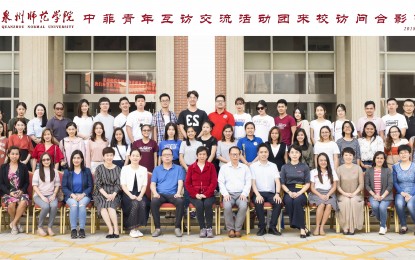
CHINA-PH YOUTH EXCHANGE PROGRAM. The delegates to the first ever youth exchange program pose for a group photo. (Photo courtesy of Quanzhou Normal University in China)
FUZHOU, China -- Fujian Foreign Affairs official and Chinese and Filipino delegates believe that the first ever China-Philippines Youth Friendly Exchange Program will ensure that friendly relationship between the two countries will continue growing in the coming years.
Lin Xuefeng, deputy general director of Foreign Affairs Office (FAO) of the Fujian Provincial People’s Government, said youth exchange program plays a “very important role” in the long-term development of bilateral relations between China and the Philippines.
“I hope the youth from China and the Philippines will work together, learn from each other, to become bridges among the two countries. I wish the China-Philippines relationship will be a better and long-term friendship,” Lin said in his speech at the Youth Party Banquet on Oct. 31.
Lin noted that youths from the two countries have become familiar with each other, and some even became close friends.
“The youths of both countries throughout the trip took part in various activities; trainings, seminars, travel together, learn together, which I think is fruitful,” he said.
Lin pointed out the long history of China-Philippines friendship.
“The friendly relation between China and the Philippines is rooted in history. The bilateral relation lies on economy and trade as well as people to people exchanges,” he added.
The two-week program was sponsored by FAO of the Fujian Provincial People’s Government, Friends of the Philippines Foundation, China Embassy in the Philippines, China Consulate General in Cebu, and China Consulate General in Davao.
A total of 54 delegates composed of Filipino and Chinese students, youth leaders, government officials and journalists participated in the youth exchange program between China and the Philippines held from Oct.18 to Nov.1.
Chinese and Filipino youngsters shed tears as they bid farewell to their newfound foreign friends whom they shared meals, bullet train and plane rides, stories about both countries’ traditions, cultures, among others, during the program.
“It has been a pleasure to be part of this program. I agree with Mr. Lin that it is a bridge to build better relationship between China and the Philippines. I have become a witness to this (friendly) bond between the youths and even I myself have learned a lot about China. It has become an avenue to learn more about China and be appreciative of China,” said Ethel Natera of China Consulate Office in Cebu.
Nina Patricia Cesar of Davao, in an interview Monday, said she had built friendships beyond Nihao (hello) during the youth exchange program.
“I lost my grandfather on Oct. 29 and I felt helpless because I could not go home immediately. But my Chinese and Filipino friends I met here helped me in many ways. There is a bright future for the two countries filled with respect, development, hope and peace. With this program, my curiosity about China grew to more interest for the country. My anxiety (was) gone because of the friendships and my expectation exceeded,” she said.
Zhang Yuming recalled her excitement and nervousness at the start of the program, as well as the many activities the youths did together like singing songs while on the bus and playing games after meals.
“We ate five meals in a day in Davao, we ate lechon in Cebu. We went to the seaside in Xiamen, I felt cold but warm inside because of you guys. We helped each other because we love each other. This is just the beginning of our friendship,” she added.
In the Philippines, the delegates visited universities, provincial and city government offices as well as the famous Rizal Park and some other tourist and historical spots in Manila, Cebu and Davao.
They also explored Chinese history, culture, tradition, and educational system, as they visited universities, tourist spots, and government offices, in the different cities of Fujian Province in China.
Ateneo De Davao president Father Joel Tabora, in his speech before the delegates on Oct. 21, said friendship and collaboration to be real cannot be confined within diplomacy and memorandum.
“It must happen between real people with all their differences in religions, cultures, among others, coming together in friendship and overcoming the differences. Such friendship will expand in the two countries,” he said.
More Exchanges Expected
Cai Wenzhi, Deputy Director of International Exchange Program of FAO-Fujian, in an interview, said impending sisterhood agreement between Jinjiang in Fujian and Davao City will be an addition to the many sisterhood agreements between cities of Fujian and the Philippines.
He disclosed that Jinjiang and Davao are set to sign the sisterhood agreement this year.
“With sisterhood agreements, both sides can have a lot of exchanges in such field as culture, tourism, education, even environmental protection and so because our sister cities are always our focus and priority for expanding our international exchanges and corporation,” Cai said.
He added that Fujian will purchase more tropical fruit like mangoes and make more investments, while it offered scholarship grants in Cebu, which is a sister city of Xiamen City, Fujian.
“Students from Cebu will come to Fujian next year to study bachelor, master and doctorate degree. We give scholarships each year worth RMB60,000 to cover all their expenses,” Cai said. (PNA)
